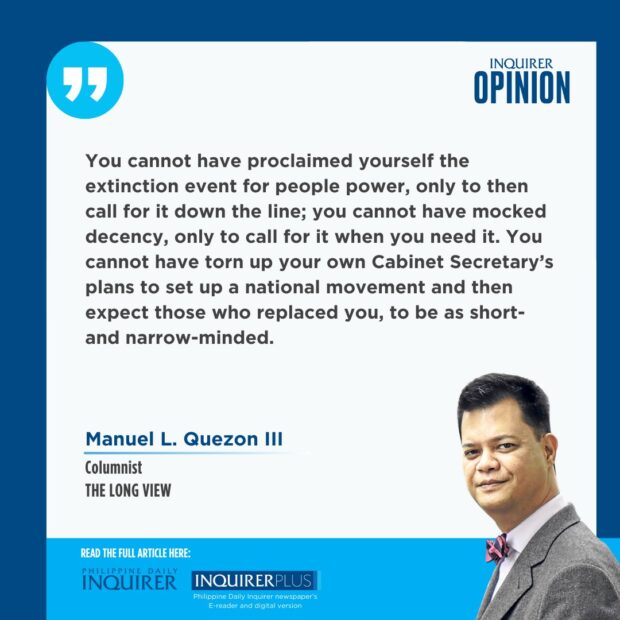And then there were none

Even at the height of their power, their problem was whether, in the era of the Great Eagle Father, you could even summon a crowd. Because having a Great Eagle Father was against the whole idea of people power the moment “the people” gave him the presidency (his was, after all, the last of the old-style, Fifth Republic, minority presidencies: Rodrigo Roa Duterte’s mandate was 39.01 percent, lower than Benigno Aquino III’s 42.08 percent, Gloria Macapagal Arroyo’s 39.99 percent, Joseph Estrada’s 39.86 percent, and only higher than Fidel Ramos’ 23.58 percent). His deal was the standard strongman’s: He would take, unto himself, the moral and political responsibility for ordering what no one else could or would otherwise dare to do. With absolute power comes absolute responsibility—as the International Criminal Court investigation daily reminds him during his post-presidency.
So at the height of his power and responsibility, the same public that elected Duterte Youth to the party list denied the Duterte Youth more than a handful of people at the Luneta whenever they tried to make a show of force. When former president Gloria Macapagal Arroyo managed to convince the Dutertes and the Marcoses in time that, yes, politics is addition, thus eliminating risk from a standard, Fifth Republic-style three-or-more-way contest, her doing provided Ferdinand Marcos Jr. with a unique gift: The first post-1986 majority presidency and at a scale only the very senior could even recall. She and others may have considered the new President either too callow or compromised to resist their expectations but didn’t count on either of his maternal cousins (and his wife) backstopping him to a degree that has systematically neutralized them.
The first to fall was Arroyo; next, though not for lack of trying to remain fearsome and thus, relevant, was the elder Duterte and along the way, his former associates; after putting his media assets on the defensive, and now, Apollo Quiboloy himself; and of course, lèse-majesté is being committed against Vice President Sara Duterte on a daily basis, leaving her flailing about as their infrastructure and support base are chipped away.
The bargain Duterte offered once upon a time, locally and nationally, was the oldest kind our presidents have made: to maintain order regardless of the price, since that cost would be paid by the president. But gradually, and perhaps even imperceptibly to Duterte himself, he has become more of an exponent of disorder than anything else: toying dangerously with the military’s loyalties, and even playing fast and loose with the territorial integrity of the republic itself: and to no crowd-pleasing purpose, instead the beneficiaries of his exertions are Philippine offshore gaming operators, Beijing, and Quiboloy who will have to render unto Caesar what is Caesar’s, which is justice here on earth.
It may be that the seemingly pitiful few—pitiful in the sense not only of their loyalty to their disgraced cult leader hiding in a bunker, but pitiful in the sense of the tens of thousands that were assumed to be at Quiboloy’s beck and call politically—gathered in Davao, at the Liwasang Bonifacio (where they withdrew after banging on the shut security gates at Chino Roces Bridge) and elsewhere, are doing so out of heartbroken devotion. But they are the last gasps of a phenomenon that has slowly been extinguished over the past two decades.
The Ampatuans proved that Manila’s use of those who abuse in the periphery, can and will, sooner or later result in Manila having to crack down when the abuses reach proportions even Manila can no longer ignore. Duterte himself was part of this phenomenon and, to his credit, he leveraged it into achieving the long-postponed (since the time of former vice president Emmanuel Pelaez) turn of Mindanao to taking its turn ruling the roost. But he himself, once in power, tolerated no resistance and, once out of power, a Manila in the hands of a president invested with more political legitimacy—because of a truly majority mandate—than anyone since 1986 (or, in a “normal” election, since 1965) would have little reason to tolerate Duterte reverting to type when his type had already become obsolete.
You cannot have proclaimed yourself the extinction event for people power, only to then call for it down the line; you cannot have mocked decency, only to call for it when you need it. You cannot have torn up your own Cabinet Secretary’s plans to set up a national movement and then expect those who replaced you, to be as short- and narrow-minded. Most of all, you cannot turn back the clock.
But you can reap what you sowed.
Former (and most likely, future) senator Panfilo Lacson did make one criticism, about the current cops zeroing in on Quiboloy: There is no need, he says, to be telegraphing your every move to the public and fugitives from justice alike.
It’s enough to emphasize the eternal law of the political jungle: who is malakas, and who is now mahina.
1 thought on “The Long View: And then there were none”